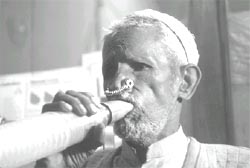Right medicine?
 two new herbal drugs, Respicare and Asmon, have been launched in the market to treat bronchial asthma. However, difference of opinion prevails among the allopathic and Ayurvedic practitioners about the efficacy of the drugs. Bronchial asthma is caused by allergens and leads to difficulty in breathing. Around five million Indians suffer from asthma.
two new herbal drugs, Respicare and Asmon, have been launched in the market to treat bronchial asthma. However, difference of opinion prevails among the allopathic and Ayurvedic practitioners about the efficacy of the drugs. Bronchial asthma is caused by allergens and leads to difficulty in breathing. Around five million Indians suffer from asthma.
Though inhalers are effective in controlling the symptoms of asthma, they have side effects like brittleness of bones, hypertension, changes in the skin structure, diabetes and cataract. They can also cause yeast infection in the mouth and hoarseness of voice. On the other hand, herbal drugs do not have adverse side effects.
Bacfo Pharmaceuticals (India) Limited, a New Delhi-based company, claims its medicine, Respicare, will provide relief to asthma patients.
| Common name | Botanical name |
RESPICARE Mulethi Tulsi Maricha Pipali Shunthi Puskharmool Talispatra Vanshlochana Vrihadela Gulbanafsa Karkat Shringi ASMON Kamini Latakasturi Ajwain Lavang Vasa Dudhi Curry patta |
|
Similar claims have been made by the Indian Institute of Chemical Biology ( iicb ), Kolkata, which has developed the medicine Asmon, being manufactured by Herbochem Remedies (India) Private Limited. Asmon is effective, claim the manufacturers, in controlling bronchial asthma while Respicare’s manufacturer says its herbal product can also help to deal with related problems like bronchitis (asthma caused due to viral or bacterial infections) and infections of the nose and throat.
Respicare has been made with herbs mentioned in Ayurvedic texts and the tablet is supposed to be effective in reducing respiratory problems caused due to pollution. The concoction consists of 11 herbs, most of which are commonly used by traditional practitioners. “Though viral or bacterial infections and pollen grains cause most of he respiratory problems, they are more commonly related to allergens such as cigarette smoke and exhaust fumes,” points out S Kumar, vice president, projects, research and development at Bacfo.
To check the effectiveness of the tablet, clinical trials based on observation were carried out on 264 patients and the medicine’s effectiveness was tested for six months. The patients were studied and the results were classified as those showing complete improvement, partial improvement and no improvement at all.
The tests showed that the use of steroids, inhalers and nebulisers was reduced by those using Respicare. “Though the preparation does not cure respira tory problems, it effectively controls the disease without showing the adverse effects caused by allopathic medicines,” says Bhojraj Singh of the Ritnand Baldev Medical Foundation, Ayurvedic Clinical Centre.
Asmon, on the other hand, is made from plants that are not used in the Indian system of medicine to treat asthma. “While the plants used to prepare the tablet are mentioned in the Ayurvedic texts, they are not used for solving respiratory problems,” says Samir Bhattacharya, director, iicb . The drug has been tested on guinea pigs by carrying out double blind studies and using control sets of animals. But tests on human beings have been carried out using the Ayurvedic method of observation only.
Under iicb ’s direction, Ayurvedic practitioners tested the drug on 200 patients and it showed improvement in more than 80 per cent of the patients. During the eight weeks that the patients were kept under observation, it was seen that the number of times the patients had to use the inhaler was also reduced gradually. The optimum dosage as per the weight of the patient was also determined and the drug has not been found toxic even at two gm per kg weight.
Unlike in the case of Respicare, the chemical action of Amon is known. While allopathic drugs are usually used to control symptoms like breathlessness and generally act by dilating the bronchioles (small compartments in the lungs) or by reducing the infection, Asmon acts on the root causes responsible for asthma.
The drug inhibits the breakdown of Arachdonic acid, which reduces the production of leukotrines
Related Content
- Order of the Patna High Court regarding management of COVID-19 situation in Bihar, 21/04/2021
- Order of the Supreme Court regarding redressal of grievances of migrant labourers in different part of India, 31/03/2020
- Intellectual property evolution and innovation ecosystem as effective tools in strengthening Indian healthcare sector
- Determining the scope of attacks on health in four governorates of Syria in 2016: Results of a field surveillance program
- Medicine procurement and the use of flexibilities in the Agreement on Trade-Related Aspects of Intellectual Property Rights, 2001–2016
- CMR lays down new rules for clinical trials and consent, applies them to traditional medicine
